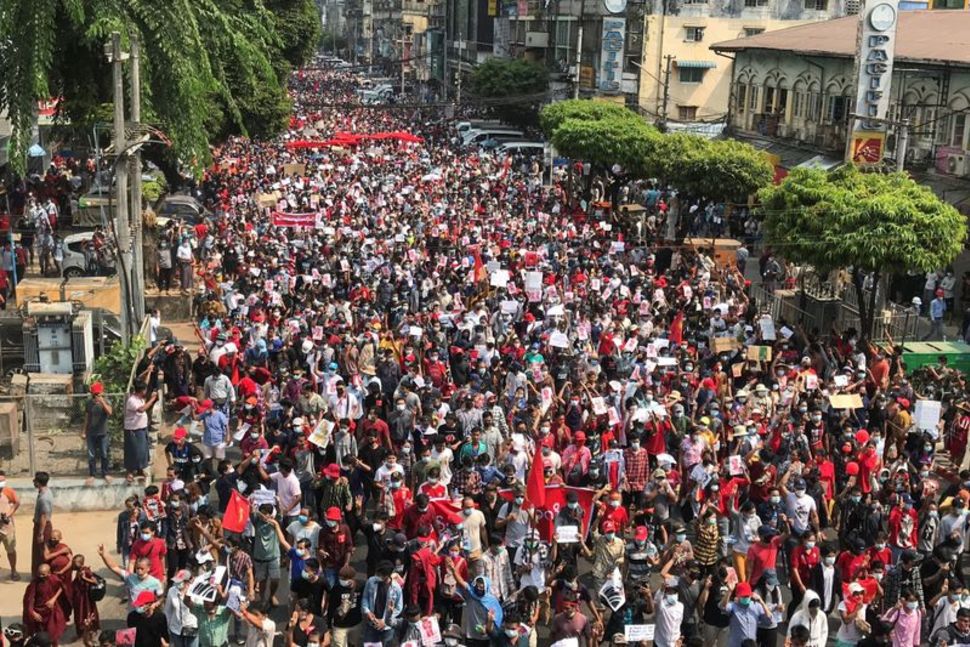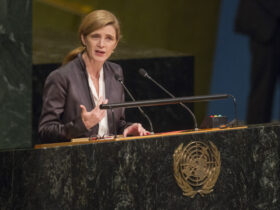On February 1, the Tatmadaw, Myanmar’s military, took power and detained the country’s civilian leader, Aung San Suu Kyi, and numerous other politicians in their homes. The coup d’etat resumes full military rule in the nation after a period of democracy first implemented in 2011. Prior to the democratic decade, the military had held power since 1962.
The coup occurred in reaction to the most recent parliamentary election. On November 8, 2020, one of the leading parties, the National League for Democracy (NLD), won over 80% of the available parliamentary seats. The vote was seen as a popular endorsement of the NLD, which Aung San Suu Kyi has led since 2015. Ms. Suu Kyi has been hailed as a beacon of democracy and won the Nobel Peace Prize in 1991. However, her international reputation has suffered following her refusal to condemn crackdowns on the Muslim Rohingya minority in Myanmar, and the subsequent human rights crisis, genocide and migration that has followed.
The election was expected to be ratified in a parliamentary session this week. The Tatmadaw, led by General Min Aung Hlaing, did not endorse the results.
In Myanmar, the Tatmadaw’s influence is felt in all aspects of society, a relic of its multi-decade long rule. It has its own schools, hospitals and food production systems. Its elite are married into the business world and high-ranking members of the NLD. The party also controls the two largest conglomerates with interests in resources, banking, infrastructure, insurance, media and more.
The democratic constitution did little to disentangle the military’s power and in some instances, reinforced it within the new political institutions.
Prior to the coup, the Tatmadaw was constitutionally guaranteed control of the ministries of defense, home affairs and border affairs. It reserves 25% of seats in national and regional assemblies. Also, it has veto authorities over certain amendments to the constitution.
The Tatmadaw invoked some of these provisions to declare a state of emergency as a justification for the coup, claiming allegations of voter fraud. Under the constitution however, only the civilian leader can claim a state of emergency which lasts for one year. Independent rights groups have criticized the election for excluding ethnic minorities, however, the nation’s election committee accepted the results and found no evidence of voter fraud.
Because of the constitution’s structure guaranteeing certain roles to the military, the Tatmadaw’s power fundamentally does not change with the coup, rather the appearance of power does. Experts have claimed that the military’s actions are still characteristic of the country’s democratic backsliding because the institutions allowing for a people’s voice have been ignored.
While the motives for the coup have not been made public, some suspect the coup provides a means for the military’s leader, Commander-in-Chief Min Aung Hlaing, to stay in power. He was scheduled to retire this year upon reaching the Defense Service Act’s mandatory retirement age of 65. The elected civilian president would have chosen a successor, meaning that the NLD likely would have chosen a more reform minded leader.
The citizens of Myanmar have not reacted kindly to the coup. This past week, tens of thousands of people have protested the Tatmadaw’s actions in Yangon, Myanmar’s largest city. Chants of “We don’t want military dictatorship, we want democracy” could be heard throughout the city, and many protesters held posters of Aung San Suu Kyi and other detained officials. The Tatmadaw claims it will hold free and fair elections after reconstituting the election commission, although did not specify when elections would take place.
The Tatmadaw has attempted to prevent the protest through a series of measures, including internet blackouts and false news reports of detained officials’ release.
But protests have spilled over into neighboring Bangladesh, where Myanmar national Rohingya Muslims have taken refuge following previous violent crackdowns on ethnic-minorities by the Tatmadaw.
Few reports of violence have come as a result of the protests, with one instance of gunshots and one report of police authorities using rubber bullets to break up a rally. The Saffron Revolution of 2007, a prior protest movement of similar scale, resulted in at least 13 dead and hundreds injured and arrested. The protests began in response to a state-sponsored jump in fuel prices, but turned against the military rule. The Saffron revolution was considered an important stepping stone in Myanmar’s shift to democracy in 2011. The Tatmadaw has remained largely silent over the public’s opposition to the coup.
Throughout the West, governments quickly condemned the actions of the Tatmadaw, although defining the takeover has been a bit more nuanced. British Prime Minister Boris Johnson and President of the European Council Charles Michel denounced the coup and called for the detained officials’ immediate release. U.S. President Joe Biden, however, has criticized the military’s “assault on the country’s transition to democracy” and threatened sanctions, but stopped short of calling the actions a coup.
Nearby countries in Southeast Asia have had more mixed reactions to the recent events. Cambodian leader Hun Sen refused to comment on the “internal affairs of another country;” whereas Singapore, Indonesia and Malaysia expressed concern over the Tatmadaw’s actions.
China, the region’s most powerful country, blocked a United Nations Security Council statement condemning the Tatmadaw. China claims that sanctions or international pressure may make the situation worse in Myanmar.
As the events in Myanmar unfold, key things to look out for include the development of protests, the international community’s actions, and the military’s response to each respective interest.







